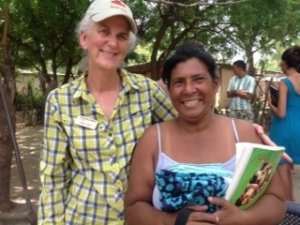Meet a Donor – Helen Brown
Helen Brown is a professor of Nutrition at the University of Idaho and a monthly donor to CEPAD. She has been taking students to Nicaragua for some years but recently began using her professional knowledge to strengthen CEPAD’s methods to measure impact. Here she shares some reflections from her recent trip.
During my travel around the world at the young and impressionable age of 19, I began on a career path of nutrition and public health. Putting my vision of international nutrition work on hold to raise a family and support my husband in ministry, I found many ways to work stateside in nutrition and public health among vulnerable and low resource populations.
In 2012, members of our First Presbyterian Church of Moscow, Idaho embarked on a one-week mission trip to Las Salinas, Nicaragua. Since that time I have begun to take a group of 10-12 students each year to spend time with CEPAD learning about community development practices among other things.
Recently, a CEPAD staff member called to ask if I knew of anyone that worked in monitoring and evaluation, skills that were needed to identify impacts on diet diversity, food insecurity and sustainable agriculture methods. My heart did a happy leap – I was working on evaluation and monitoring projects and my background in nutrition and food security seemed well matched.
I traveled to Nicaragua in March of 2016 to meet with staff and communities to assist with monitoring and evaluation (M & E) efforts. CEPAD staff took me to two communities to see the sustainable agriculture projects first-hand, to help me understand the scope of the projects and to identify feasible methods of measuring project impacts.
Talking with community members opened my eyes to the far-reaching impacts of CEPAD’s work. When asked what was the most significant about CEPAD’s sustainable farming and gardening program the answers were close to home and far reaching. One young man said he now knew what a cucumber was, he hadn’t eaten one before CEPAD offered seeds and gardening know now. A single mother said she was able to feed her children after she had a successful harvest of beans that CEPAD provided. Community members shared that they had more money in their pocket because they could grow their own food and that they grew richer in friendships by working with other communities.
Many people voiced their appreciation for raising chemical free food for both their families and to protect the earth. One young man said, “Now we have hope for the future, we used to think just day to day.”
Friends ask me why I continue to return to Nicaragua, and why I support CEPAD, both professionally and personally. That is an easy question to answer. I believe in the empowering, sustainable and hope-filled work of CEPAD.



